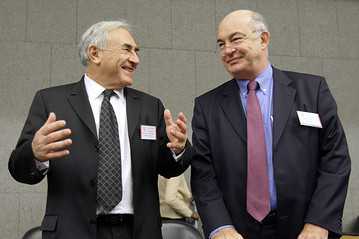By Marc Champion
ISTANBUL — No sooner had news broken concerning the arrest of International Monetary Fund chief Dominique Strauss-Kahn on sex-related charges, than Turkey’s media began to speculate Monday on whether the country’s former economy minister, Kemal Dervis, might be the one to replace him.

AFP/Getty Images
Could Turkey’s Kemal Dervis, right, replace Dominique Strauss-Kahn at the IMF?
If Mr. Dervis were to put himself forward, he’d be a strong candidate — but he’d also present German Chancellor Angela Merkel with a tough test of whether she believes a Turk counts as a European.
Ms. Merkel made it clear Monday that she would want to see a European replace Mr. Strauss-Kahn, due to the continuing travails of the euro-zone, rather than a candidate from a developing nation. Ms. Merkel also has in the past made clear her opposition to Turkey joining the European Union. That could spell a major obstacle for any bid by Mr. Dervis.
Still, Mr. Dervis would be a hard candidate to ignore. He has strong ties in Washington as well as in Western European capitals, and he would satisfy the developing world’s desire to see Europe’s lock on running the IMF broken.
Mr. Dervis joined the World Bank in 1978; he became the organization’s vice president for the Middle East and North Africa region in 1996, drawing up Bosnia’s post-war economic recovery program along the way. In 2001, he returned to Turkey to take up a job as secretary of state of the economy, crafting the economic program that lifted Turkey out of a brutal financial crisis.
Those policies were adopted more or less wholesale by the ruling Justice and Development Party, or AKP, when it came to power in 2002, and appear to have stood the test of the latest global financial crisis. Turkey’s banking system has been unscathed by the turmoil and has proved an engine of the country’s runaway recovery. As a result, Mr. Dervis is a rare example of a public figure who enjoys cross-party respect in Turkey.
Mr. Dervis joined the Republican People’s Party to run for election in 2002, and became a member of parliament in the political opposition after AKP’s victory. But he left parliament in 2005, distancing himself from Turkish politics and moving to head the United Nations Development Program. Currently, he is a vice president at the Brookings Institution in Washington, where he heads the think tank’s Global Economy and Development program.
A former economics professor, Mr. Dervis also has been drafted to a fistful of high-level commissions in Europe, including the Commission on the Measurement of Economic Performance and Social Progress, which was set up by French President Nicolas Sarkozy in 2008 to look at the adequacy of gross domestic product and other key indicators. Nobel Prize-winning economist Professor Joseph Stiglitz chaired the group.
Turkish economists say Mr. Dervis has been well-received by the government whenever he returns to visit Turkey, and that when it comes to economic policy, there’s little to separate them. “I can’t see why they wouldn’t want to support him, it would be a big coup for Turkey” — and for the government’s efforts to turn the country, already a G20 member, into a global player, said Atilla Yesilada, an economist with Istanbul Analytics, an Istanbul-based consultancy.
* IMF,
* Kemal Dervis,
* Turkey
via Would Turkey’s Kemal Dervis Pass German Chancellor Angela Merkel’s “European” Test to Head the International Monetary Fund? – Emerging Europe Real Time – WSJ.

Leave a Reply